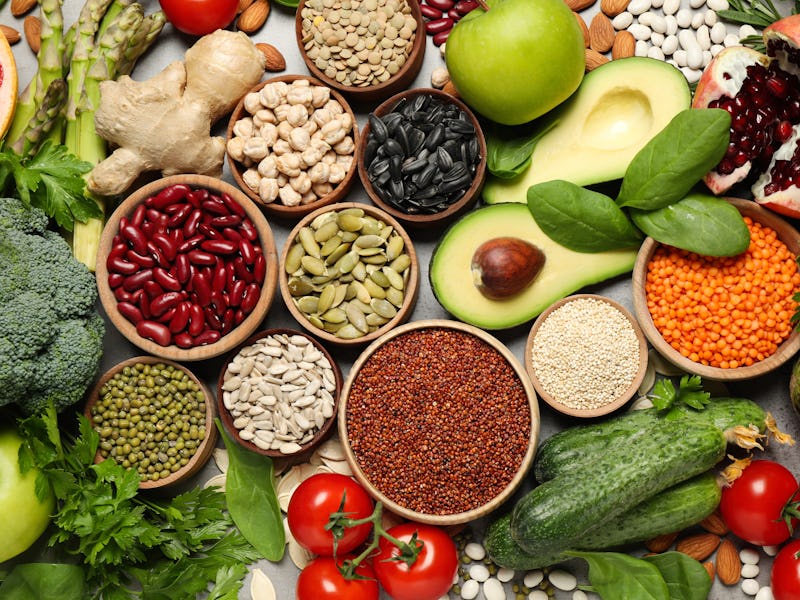Is the raw food diet healthy? A nutritionist debunks the wellness myth
Raw or cooked, just eat some vegetables.

Eat your vegetables. This phrase may bring back childhood memories, but many adults struggle with this tenet of healthy living as much as children do. Countless diets exist to get more vegetables in your daily meals.
One trendy lifestyle is the raw diet, which entails eating uncooked, unprocessed foods. There’s plenty of variation in how folks practice raw food diets, and the lifestyle has its benefits. Whole, unprocessed foods substitute for too many heavily processed grains and sugars, which can lead to an increased risk for cancer, heart disease, and other health problems. People with chronic illnesses and digestive problems may also benefit from eating whole foods.
The practice extends to vegetables, and that’s where information gets a little cloudy. Veggie Straws and Terra Chips don’t make the cut for raw, but some people draw the line at all cooked vegetables. When it comes to vegetables, is raw significantly better? Registered dietician and nutrition consultant for the Kansas City Chiefs Leslie Bonci helps us dig into the answer.
Are raw vegetables healthier than cooked vegetables?
Not necessarily, according to Bonci. “Nutritionally, the fiber, the micronutrients, the phytonutrients, it's all the same,” she tells Inverse. Phytonutrients are natural compounds found in plants.
One of the biggest purported benefits of eating raw vegetables is absorbing enzymes, which cooking supposedly removes. Enzymes are proteins that facilitate metabolic reactions in our cells. Some organs, such as the pancreas, liver, and gallbladder release enzymes naturally. Insufficient production of these enzymes can lead to poor digestion, contributing to stomachaches and diarrhea.
Raw vegetables or fruit, some argue, retain their maximum amount of natural enzymes, and heat exceeding 115 degrees Fahrenheit will start to degrade some of them. Bonci, however, doesn’t prioritize raw vegetable enzymes. The enzymes are more important to the plant than they are to humans, she says, and humans get plenty else from plants besides enzymes.
Many believe that eating raw vegetables, with all their enzymes intact, is the healthiest way to consume plants.
How does cooking change a vegetable?
The cooking process does alter produce. Boiling vegetables can leach out some vitamin C, Bonci says, which is a water-soluble vitamin. Water-soluble vitamins dissolve and are stored in water. This is no reason to skip boiling or blanching, however; she recommends saving the water for broth. “If you're throwing it away, then that literally is micronutrients down the drain,” she says.
A quick dip in some hot water can be good for flavor. Dropping broccoli or carrots into boiling water for no more than three minutes — known as blanching them — can brighten their colors and make them taste a little better. Applying heat in the oven or on the stove also kills lingering bacteria. Juicing a vegetable, however, which some raw foodies do, removes the fiber, a crucial nutrient for gut health and regularity.
Cooking can also change how a vegetable tastes. Bonci recognizes that making vegetables taste good is just as important as eating them — whether that means some ranch for dipping or mixing greens into macaroni and cheese. Technically, steaming is the healthiest method because it doesn’t require oil, but fat isn’t necessarily bad. It can actually aid digestion and nutrient absorption.
One doesn’t have to cook vegetables to incorporate fat, however. Avocado naturally contains fat, so adding it to a salad checks that box. Homemade tahini or hummus also makes for a dip made from whole foods with lots of lipids.
Raw isn’t always an option. Frozen or canned vegetables taste better when they’ve been cooked and fresh ingredients aren’t always easy to come by. Sometimes the only vegetables available come from supermarket shelves. There’s a reason raw diets have an allure for influencers, who may be able to regularly afford not only fresh vegetables, but accouterments like raw-friendly wraps, crackers, and other pricy food substitutes that fit the lifestyle.
Boiling vegetables with water-soluble fiber and vitamins can remove some vitamin C, but then use the nutritious broth!
Are there any benefits to a raw-veggie diet?
A raw diet is perfectly fine for anyone who prefers it, Bonci says, but it’s not a superior way to eat your greens.
Vegetables, Bonci says, are anywhere from 90 to 99 percent water. This is a plus in terms of hydration, but it means that eating vegetables alone can result in fullness from water without any protein. Eating a head of lettuce with a few tomatoes and carrots may make one feel full, but doesn’t comprise a balanced diet.
Still, raw vegetables can limit refined sugar and carbohydrates while boosting the intake of vitamins and fiber. The bottom line, Bonci says, is the best way to eat vegetables is any way that you enjoy. “A vegetable is only good if you eat it,” she says. “If it sits in the pan or goes in the garbage can that’s kind of useless.”
CHECK, PLEASE is an Inverse series that uses biology, chemistry, and physics to debunk the biggest food myths and assumptions.
Now read this: Does submerging an avocado in water keep it fresh? The science behind the hack
This article was originally published on